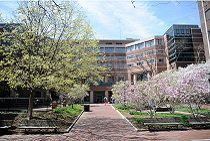 PHILADELPHIA — The Aresty Institute for Executive Education at the Wharton School announces a first-of-its-kind MBA-level program for financial professionals called Raising Capital to Fund Growth. Based on two Wharton graduate courses and taught by the same world-class faculty, this program, to be held June 11-14, 2013 in Philadelphia, provides a rigorous look at additional ways to fund growth and to manage risk.
PHILADELPHIA — The Aresty Institute for Executive Education at the Wharton School announces a first-of-its-kind MBA-level program for financial professionals called Raising Capital to Fund Growth. Based on two Wharton graduate courses and taught by the same world-class faculty, this program, to be held June 11-14, 2013 in Philadelphia, provides a rigorous look at additional ways to fund growth and to manage risk.
Wharton Professors of Finance David Musto and Bilge Yilmaz will provide cutting-edge knowledge of capital markets, including risk management, tax management, and agency and distress issues. “Today’s financial professionals may have deep knowledge in some areas of capital markets, but that knowledge may not be up to date, as tax codes, regulations, policies, and security designs change,” says Musto. “Financial professionals may also be promoted to new responsibilities that demand a broader perspective. We have therefore designed this course to present the big picture, while focusing on the latest practices and concerns.”
The program is designed for corporate finance professionals working within the CFO organization of their US firm, or with a professional service firm; government regulators; and bankers who desire to update their knowledge and skills with respect to US capital markets. It includes the mathematical and financial rigor typically found in MBA-level graduate courses; however, faculty will review financial concepts to build a common language for those who have not recently taken a finance course.
Raising Capital to Fund Growth begins with a one-day review of key topics related to capital markets: risk management, capital structure, discounted cash flow analysis and the “multiples approach” to valuation. Days two and three include sessions on selecting corporate structures that foster tax efficiencies for the future, and on bank lending and short-term finance. In the fourth and final day of the program, participants will examine capital structure policy, the theory and practice of bond contracting, negotiating distressed debt, and bankruptcy issues and opportunities innovation in securities’ design.
Musto, who teaches the Capital Markets course to Wharton MBAs, stresses the importance of developing a broader perspective. “You might be familiar, for example, with issuing bonds, but do you understand how the bond contract constrains your future choices, and how you address those constraints? What if someone tries to take you over? Understanding these potential situations will help you make better decisions—ones that can have a positive outcome for your firm.”
“The program is a great opportunity for finance professionals to update their knowledge and skills,” he continues. “Today’s pace of change means it’s difficult to stay current on best practices. With Raising Capital to Fund Growth, in four days you can deepen your knowledge of capital market options.”
For more program information: http://www.executiveeducation.wharton.upenn.edu/open-enrollment/finance-programs/raising-capital-fund-growth.cfm
ABOUT THE WHARTON SCHOOL
Founded in 1881 as the first collegiate business school, the Wharton School of the University of Pennsylvania is recognized globally for intellectual leadership and ongoing innovation across every major discipline of business education. Informed by in-depth academic research and extensive industry experience, Wharton Executive Education programs offer a supportive and challenging context from which participants gain the skills necessary for their next level of executive development. In open-enrollment and customized programs, participants from a diverse range of industries interact with Wharton faculty, who are one of the most cited, most published faculties of all top-tier business schools. With a profound influence on global business, Wharton faculty are the trusted advisors of corporations and governments worldwide.



